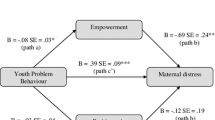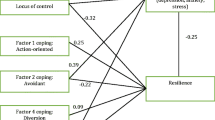Abstract
Psychological adjustment to having one’s child diagnosed with an autism spectrum disorder has important implications for a parent’s mental health. In a longitudinal study, we examined the association between maternal adjustment to the diagnosis and measures of distress and well-being in 90 mothers of children with autism (baseline and 18 months). We used a novel 30-item scale “Adjustment to the Diagnosis of Autism.” Factor analysis identified three dimensions of adjustment: acceptance, self-blame, and despair. Acceptance appeared to be a protective response, as it was associated with lower depressive symptoms, cross-sectionally and over time. Conversely, caregivers with increasing levels of self-blame and despair about the diagnosis over 18 months had worsening of mental health and satisfaction with life during this period.
Similar content being viewed by others
References
American Psychiatric Association. (1994). Diagnostic and statistical manual of mental disorders (4th edn.). Washington, DC.
Barroso, N. E., Mendez, L., Graziano, P. A., & Bagner, D. M. (2017). Parenting stress through the lens of different clinical groups: A systematic review and meta-analysis. Journal of Abnormal Child Psychology, 45, 1–13.
Berry, J. O., & Jones, W. H. (1995). The parental stress scale: Initial psychometric evidence. Journal of Social and Personal Relationships, 12, 463–472.
Boyd, B. A. (2002). Examining the relationship between stress and lack of social support in mothers of children with autism. Focus on Autism and Other Developmental Disabilities, 17, 208–215.
Burns, D., & Sayers, S. (1992). Development and validation of a brief relationship satisfaction scale. Philadelphia, PA: Unpublished manuscript, Department of Psychiatry, Presbyterian Medical Center of Philadelphia.
Cohen, S., & Williamson, G. (1988). Perceived stress in a probability sample of the United States. In S. Spacapam & S. Oskamp (Eds.), The social psychology of health: Claremont symposium on applied social psychology (pp. 31–67). Newbury Park, CA: Sage.
Da Paz, N. S., & Wallander, J. L. (2017). Interventions that target improvements in mental health for parents of children with autism spectrum disorders: A narrative review. Clinical Psychology Review, 51, 1–14.
Dababnah, S., & Parish, S. L. (2016). A comprehensive literature review of randomized controlled trials for parents of young children with autism spectrum disorder. Journal of Evidence-Informed Social Work, 13, 277–292.
Davis, N. O., & Carter, A. S. (2008). Parenting stress in mothers and fathers of toddlers with autism spectrum disorders: Associations with child characteristics. Journal of Autism and Developmental Disorders, 38, 1278–1291.
De Andrés-García, S., Moya-Albiol, L., & González-Bono, E. (2012). Salivary cortisol and immunoglobulin A: Responses to stress as predictors of health complaints reported by caregivers of offspring with autistic spectrum disorder. Hormones and Behavior, 62, 464–474.
Diener, E., Emmons, R. A., Larsen, R. J., & Griffin, S. (1985). The satisfaction with life scale. Journal of Personality Assessment, 49, 71–75.
Gottlieb, B. (1988). The dislocations scale. Guelph, ON: Unpublished manuscript: University of Guelph
Hayes, S. A., & Watson, S. L. (2013). The impact of parenting stress: A meta-analysis of studies comparing the experience of parenting stress in parents of children with and without autism spectrum disorder. Journal of Autism and Developmental Disorders, 43, 629–642.
Lazarus, R. S., Cohen, J. B., Folkman, S., Kanner, A., & Schaefer, C. (1980). Psychological stress and adaptation: Some unresolved issues. In H. Selye (Ed.), Selye’s guide to stress research (Vol. 1, pp. 90–117). New York: Van Nostrand Reinhold.
Lloyd, T., & Hastings, R. (2009). Hope as a psychological resilience factor in mothers and fathers of children with intellectual disabilities. Journal of Intellectual Disability Research, 53, 957–968.
Lord, B., Ungerer, J., & Wastell, C. (2008). Implications of resolving the diagnosis of PKU for parents and children. Journal of Pediatric Psychology, 33, 855–866.
Lovell, B., Moss, M., & Wetherell, M. A. (2012). The psychosocial, endocrine and immune consequences of caring for a child with autism or ADHD. Psychoneuroendocrinology, 37, 534–542.
Lovell, B., Moss, M., & Wetherell, M. A. (2016). Assessing the feasibility and efficacy of written benefit-finding for caregivers of children with autism: A pilot study. Journal of Family Studies, 22, 32–42.
Osborne, L. A., Mchugh, L., Saunders, J., & Reed, P. (2008). Parenting stress reduces the effectiveness of early teaching interventions for autistic spectrum disorders. Journal of Autism and Developmental Disorders, 38, 1092–1103.
Pianta, R., & Marvin, R. (1992). The reaction to diagnosis classification system. Charlottesville, VA: Unpublished manuscript, University of Virginia.
Rush, A. J., Giles, D. E., Schlesser, M. A., Fulton, C. L., Weissenburger, J., & Burns, C. (1986). The inventory for depressive symptomatology (IDS): Preliminary findings. Psychiatry Research, 18, 65–87.
Ryff, C. D. (1989). Happiness is everything, or is it? Explorations on the meaning of psychological well-being. Journal of Personality and Social Psychology, 57, 1069.
Schopler, E., Reichler, R. J., Devellis, R. F., & Daly, K. (1980). Toward objective classification of childhood autism: Childhood Autism Rating Scale (CARS). Journal of Autism and Developmental Disorders, 10, 91–103.
Sheeran, T., Marvin, R. S., & Pianta, R. (1997). Mothers’ resolution of their childs’s diagnosis and self-reported measures of parenting stress, marital relations, and social support. Journal of Pediatric Psychology, 22, 197–212.
Tehee, E., Honan, R., & Hevey, D. (2008). Factors contributing to stress in parents of individuals with autistic spectrum disorders. Journal of Applied Research in Intellectual Disabilities, 22, 34–42.
Townshend, K., Jordan, Z., Stephenson, M., & Tsey, K. (2016). The effectiveness of mindful parenting programs in promoting parents’ and children’s wellbeing: A systematic review. JBI Database of Systematic Reviews and Implementation Reports, 14, 139–180.
Whitmore, K. E. (2016). Respite care and stress among caregivers of children with autism spectrum disorder: An integrative review. Journal of Pediatric Nursing, 31, 630–652.
Acknowledgments
We gratefully acknowledge the time of caregivers and families who participated in this study. We also thank Alexandra Crosswell, Julie Vaccaro, Stefanie Mayer, Rachel Radin, and Carlos Almeida for their constructive and insightful comments on this manuscript. This study was supported by the National Institute on Aging, award numbers R01 AG030424 and R24AG048024, and the Althea Foundation, San Francisco.
Funding
This study was supported by the National Institute on Aging, award numbers R01 AG030424 and R24AG048024, the Goldman Fund, and the Althea Foundation.
Author information
Authors and Affiliations
Contributions
ND conceived of the current hypotheses, performed the relevant statistical analyses, and drafted the manuscript. BS developed the novel scale and assisted with drafting the manuscript. MC participated in the design of the study and assisted with statistical analyses and interpretation of the data. EE conceived of the larger prospective study on chronic caregiving stress and cellular aging (SAGE) from which the data was extracted, coordinated its design and data collection, and helped to draft the manuscript. All authors read and approved the final manuscript.
Corresponding author
Ethics declarations
Ethical Approval
All procedures performed in this study were in accordance with the ethical standards of the institutional and/or national research committee and with the 1964 Helsinki declaration and its later amendments or comparable ethical standards. All participants provided written, informed consent using IRB approved procedures.
Conflict of interest
All authors declare that there is no conflict of interest.
Rights and permissions
About this article
Cite this article
Da Paz, N.S., Siegel, B., Coccia, M.A. et al. Acceptance or Despair? Maternal Adjustment to Having a Child Diagnosed with Autism. J Autism Dev Disord 48, 1971–1981 (2018). https://doi.org/10.1007/s10803-017-3450-4
Published:
Issue Date:
DOI: https://doi.org/10.1007/s10803-017-3450-4




